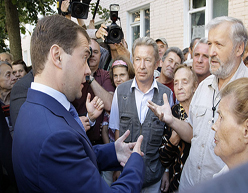Kremlin now fully intent to protect small- and medium-scaled enterprises from increasing official lawlessness

ZVENIGOROD, Moscow Region - At a government meeting dedicated to the reduction of the nearly insurmountable administrative barriers in the small- and medium-scaled enterprises (SME) segment of the country’s economy, Russian President Dmitry Medvedev made it clear to everyone that the unconditional protection of the SME owners is a top-priority state task not only for the Kremlin, but also for the all administrative organs in the so-called ‘executive vertical.’
At the meeting, the president gave the SME representatives the opportunity to put forward all their problems and difficulties so that he would receive from the ‘horse’s mouth’ the real picture of how small-scaled private businesses actually exist in the country and how they are putting up with the current global financial crisis that has negatively impacted on the Russian economy.
The owners of SMEs really had lots to complaint about, from the overwhelming barriers on securing ownership of office premises, underdevelopment of financial services, monopolization of state services by corrupt government officials, sky-high interest rates that put bank loans needed for further development of business operations beyond the reach of the SMEs to the reluctance or outright unwillingness of state officials to abandon their illegal bureaucratic and other anti-business practices, including frequent inspections of the SMEs and destabilization of their operations on flimsy excuses or trumped-up charges, etc.
For example, according to the official information on corrupt bureaucratic practices prepared for the meeting, the number of cases of unfounded inspections of the SMEs and infringements of all legal requirements pertaining to the periodicities of such checks, etc., has continued to remain high and rampant. “Such practices are still widespread in the activities of such state agencies as the Environmental Control Agency (Rosprirodnazor), Consumer Services Rights Protection Agency (Rospotrebnadzor), Labor and Employment Agency (Rostruda), Agricultural Control Agency (Rosselkhoznadzor), Federal Migration Service and other federal authorities in practically all the subjects of the Federation.”
Two typical cases of such official lawlessness in the SME sector narrated by two businessmen at the meeting more than highlighted the absurdity of the situation. Thus, one private businessman trying to receive a lease on a site for restaurant in one of the regional city centers, said that, apart from the traditional numerous, and at times unnecessary permissions from all possible state agencies, the Technical Control Agency (Rostechdnazor), the federal organ providing oversight on technical issues, demanded that he also carry out a comprehensive analysis of the soil composition of the site for about R100,000 (almost $3,000). More importantly, the analysis can be only done in a particular commercial structure. “Why should the construction of a restaurant in a residential zone in a city center require the search for the pathogens causing malignant anthrax (the so-called Siberian plague) and foot-and-mouth disease?” the perplexed businessman rhetorically asked the Russian president at the meeting.
Similarly, another private businessman disclosed that it usually requires more than 150 signatures and a total cost of over R250,000 in his city to get all the official permissions and other numberless documents required to rent/lease a site for business purposes. “In this regard, I think it would be more expedient for the government to establish a unified format on the costs and terms of delivery of such vital documents, and also to limit the number of government officials that could be involved in processing and final authorization of such documents.”
After listening to the SME representatives' harrowing stories on their battles with state officials over business issues, the president noted that the majority of state services that are frequently imposed on the entrepreneurs are special ‘traps’ for exhorting money from small businesses. “Most of these services are only not free- of charge, but are also highly expensive and monopolistic, thereby making it almost impossible for businesses to circumvent the structures offering such services.” Citing experts’ data, Medvedev noted that Russian businesses spend significant shares of their annual revenues on overcoming all the administrative barriers at all levels. “This is why I would like to note that our businesses are not so rich to pay for all bureaucrats’ sneezes.”
In order to create more business-friendly and really comfortable conditions for the functioning of the SMEs in the country, Medvedev ordered the Public Prosecutor’s Office, the Kremlin’s Legal Department and other related federal, regional and municipal authorities to do everything possible, including generous use of legal prosecutions, to reduce the overzealous activities of dishonest state officials parasitizing on small businesses.
“It is high time that everyone finally realized and understood that Russia has no future, without the creation of prospering SMEs. This is why the protection of all small businesses has become a top-priority task for the Russian government, in the broadest meaning of this word,” the president noted, as he concluded the high-profile meeting that was attended by all top government officials and broadcast live on major national TV channels.












 Web design,
Web design,